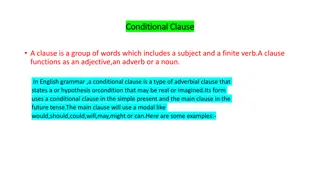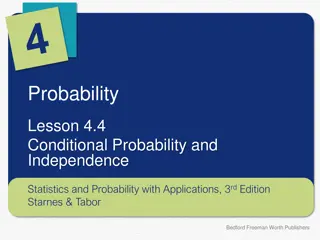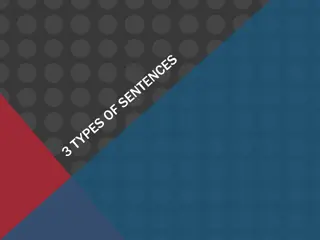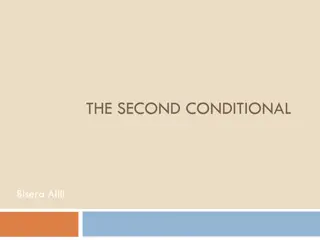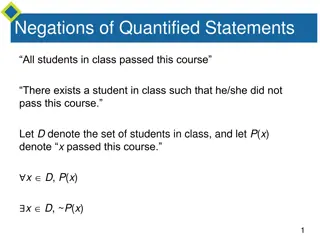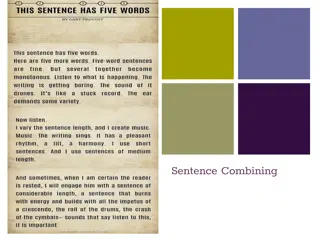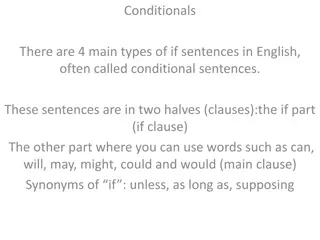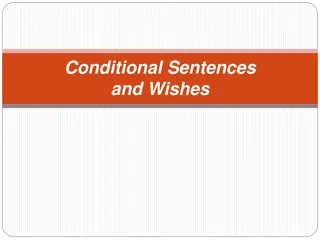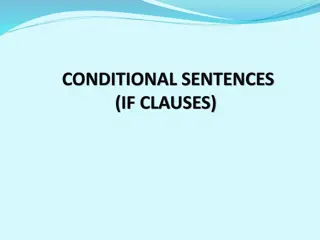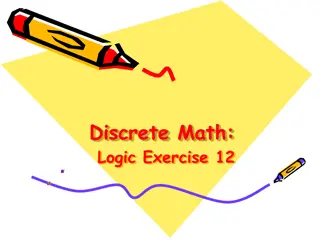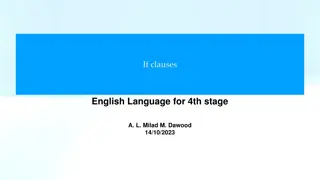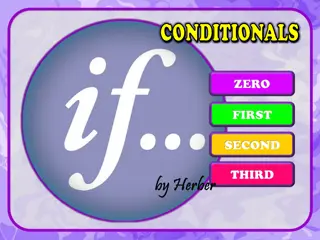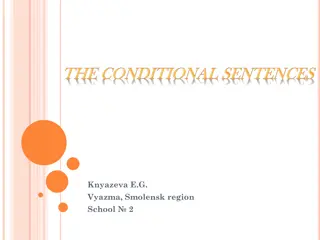Understanding English Conditional Sentences
Explore the world of English conditional sentences, covering real conditions, unreal conditions in the present, and unreal conditions in the past. Learn about different types of conditions, their forms, and examples to grasp the concept thoroughly.
Download Presentation

Please find below an Image/Link to download the presentation.
The content on the website is provided AS IS for your information and personal use only. It may not be sold, licensed, or shared on other websites without obtaining consent from the author. Download presentation by click this link. If you encounter any issues during the download, it is possible that the publisher has removed the file from their server.
E N D
Presentation Transcript
English Conditional Sentences
English conditional sentences can be of many types: 1-Real Condition: This type of condition refers to possible situations in the present or future. These situations take place if a certain condition is met. It is possible and also very likely that the condition will be fulfilled. Form: If + Simple Present + Simple Future
EXAMPLES If I have enough time, I'll watch a football match. If he leaves , he will catch the train. If I find her address, I will send her an invitation. If I don t see him this afternoon, I will phone him in the evening.
2-Unreal Condition in the present: Often called the "unreal" conditional because it is used for unreal, impossible or improbable situations. This conditional provides an imaginary result for a given situation. It is very unlikely that the condition will be fulfilled. Form: if + Simple Past + would + base verb
EXAMPLES If I were a millionaire, I would buy a castle. If I had a lot of money, I would travel around the world. If I won the lottery, I would be a millionaire. She would help the poor if she became rich. If I were you , I would not resign.
3-Unreal Condition in the past: This condition is impossible or contrary to the fact in the past. It describes a past situation that did not happen. It is impossible that the condition will be met because it refers to the past. Form: if + Past Perfect, + would + have + Past Participle
EXAMPLES If he had had enough money, he would have bought a new car. If you had worked hard, you would have passed the exam. If they had taken him to hospital earlier, he wouldn't have died. He wouldn't have missed the bus, if he had woken up earlier. The accident wouldn't have occurred if the driver hadn't been driving fast.
4. Condition with (unless): The other conditional subordinator besides (if) is (unless). It is used in a negative condition and means (except if): I am not going out unless it stops raining. It means the same as: I am not going out if it doesn t stop raining.
5. Conditional without ( if): English has conditional sentences without the conditional subordinator (if): The absence of (if) triggers subject auxiliary inversion rule: Had she arrived, I would have seen her. Should they arrive late, there will be no one to receive them. Should you need my advice, you can call me. Should you see Tom, please tell him to phone me. Had I not been ill, I would have come.
6. Factual condition (talking about facts ): In factual conditionals that are general truths, we normally use a present tense in both clauses: If we boil water, it evaporates. It is possible, however, to use modals (will) , for example, adds the idea of absolute certainty: If you heat ice, it will melt.
ARABIC CONDITIONAL SENTENCES An Arabic conditional sentence consists of two clauses : (condition) and (answer). The conditional clause normally precedes the main clause / / Arabic has three conditional particles: These particles determine the type of the condition expressed.
TYPES OF CONDITIONALS IN ARABIC 1. Fulfillable Conditions: : expresses possible condition with the verb of the conditional clause in the perfect or imperfect tense: : expresses probability. The verb of the conditional clause must be in the perfect tense:
2. Unfulfillable / Contrary - to - fact Conditions: The particle is used in unfulfillable conditions:
Also, Arabic has other conditional particles called : / nouns of condition:
CONTRAST The following differences hold between English and Arabic conditional sentences: (1)In English , the conditional clause may precede or follow the main clause, whereas in Arabic the conditional clause typically precedes the main clause. If I had won the lottery, I would have bought a house. I would have bought a house if I had won the lottery.
(2) In Arabic, the use of the different conditional particles determine the type of condition , whereas in English , condition type is determined by the sequence of verb forms. . In fulfillable conditions, / are used. In unfulfillable conditions, is used. If + Simple Present + Simple Future if + Simple Past + would + base verb if + Past Perfect + would + have + Past Participle
(3) The English conditional subordinator "if" has three counterparts in Arabic : (4) Only English has sentences without conditional subordinator "if". (5) The main clause in Arabic conditional clauses may consist of an equational (verbless) clause, this is not possible in English: ( )


